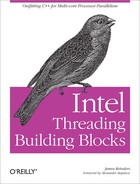Along with Intel Threading Building Blocks, another promising abstraction for C++ programmers is OpenMP. The most successful parallel extension to date, OpenMP is a language extension consisting of pragmas, routines, and environment variables for Fortran and C programs. OpenMP helps users express a parallel program and helps the compiler generate a program reflecting the programmer’s wishes. These directives are important advances that address the limitations of the Fortran and C languages, which generally prevent a compiler from automatically detecting parallelism in code.
The OpenMP standard was first released in 1997. By 2006, virtually all compilers had some level of support for OpenMP. The maturity of implementations varies, but they are widespread enough to be viewed as a natural companion of Fortran and C languages, and they can be counted upon when programming on any platform.
When considering it for C programs, OpenMP has been referred to as “excellent for Fortran-style code written in C.” That is not an unreasonable description of OpenMP since it focuses on loop structures and C code. OpenMP offers nothing specific for C++. The loop structures are the same loop nests that were developed for vector supercomputers—an earlier generation of parallel processors that performed tremendous amounts of computational work in very tight nests of loops and were programmed largely in Fortran. Transforming those loop nests into parallel code could be very rewarding in terms of results.
A proposal for the 3.0 version of OpenMP includes tasking, which will liberate OpenMP from being solely focused on long, regular loop structures by adding support for irregular constructs such as while loops and recursive structures. Intel implemented tasking in its compilers in 2004 based on a proposal implemented by KAI in 1999 and published as “Flexible Control Structures in OpenMP” in 2000. Until these tasking extensions take root and are widely adopted, OpenMP remains reminiscent of Fortran programming with minimal support for C++.
OpenMP has the programmer choose among three scheduling approaches (static, guided, and dynamic) for scheduling loop iterations. Threading Building Blocks does not require the programmer to worry about scheduling policies. Threading Building Blocks does away with this in favor of a single, automatic, divide-and-conquer approach to scheduling. Implemented with work stealing (a technique for moving tasks from loaded processors to idle ones), it compares favorably to dynamic or guided scheduling, but without the problems of a centralized dealer. Static scheduling is sometimes faster on systems undisturbed by other processes or concurrent sibling code. However, divide-and-conquer comes close enough and fits well with nested parallelism.
The generic programming embraced by Threading Building Blocks means that parallelism structures are not limited to built-in types. OpenMP allows reductions on only built-in types, whereas the Threading Building Blocks parallel_reduce works on any type.
Looking to address weaknesses in OpenMP, Threading Building Blocks is designed for C++, and thus to provide the simplest possible solutions for the types of programs written in C++. Hence, Threading Building Blocks is not limited to statically scoped loop nests. Far from it: Threading Building Blocks implements a subtle but critical recursive model of task-based parallelism and generic algorithms.
